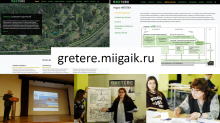15.07.2020

The online conference “How to make a university green” was organized on June 30, 2020, in partnership with the All-Russian program “Green Universities of Russia” of the ECA Movement with the support of the Agency for Strategic Initiatives (ASI), in which Associate Professor of the Department of Space Monitoring and Ecology, Director of International Projects, Dr. Galina Kuznetsova, took part as one of the speakers.
The target audience of the conference were representatives of universities participating in the first rating “Green Universities in Russia", teachers and staff who are interested in forming environmental culture in their educational institutions.The conference included the presentation of the methodological Guide “How Make University Green” so as presentations of experts participated in its preparation and summed up the results of the first rating “Green Universities in Russia".
Dr.Galina Kuznetsova presented the GRETERE project, which has been implemented in MIIGAiK for two years, which created the methodology for developing interdisciplinary professional module with integrated environmental content based on the principles of contextual approach and sustainable development, as well as the results of piloting the developed module "Green Terra Development" within the training area 07.04.01 Architecture (profile "Architecture and urbanism") and research.
The GRETERE project was included in the methodological guide as one of the successful cases implemented in universities, in the section "Education and research".
It is important to note that the actual amendments to the Constitution, based on the referendum results, include paragraph E6 in article 143 on the creation of "conditions for the development of the system of environmental education of citizens, education of environmental culture" by the Government of the Russian Federation.
Meeting moderator Dr. Natalia Ryazanova, head of the laboratory of Geoecology and sustainable nature management of the Department of international complex problems of nature management and ecology of MGIMO, representative of the Russian Association for UN assistance, made message on the creation of an interdepartmental Commission to develop a program of continuous environmental education and awareness.
Important issues were raised by the participants of the conference:
- Elena Gorokhova, Director of the EKA Movement,
- Mikhail Yulkin, General Director of the Center for Environmental Investments
- Natalia Popova, Head of the Environmental Department of Saint Petersburg State University (separate garbage collection at the University as a student project)
- Igor Osipov, Deputy Director for operation and maintenance of buildings and structures at the HSE (the University's carbon footprint)
- Dr. Roman Potolovsky, associate Professor of Volgograd State Technical University (water conservation issues)
- Dr. Igor Ogorodnikov, senior researcher at the Institute of Thermophysics SB RAS (energy saving issues)
- Ekaterina Bakeeva, founder and head of the environmental student Association of BFU named after I. Kant (creating an eco-club at the University from scratch)
Irina Tikhonova, coordinator of the Russian program “Green Universities of Russia”, shared the results of the first rating “Green Universities of Russia". The rating methodology was developed taking into account international experience and continue to be developed further. This year 60 Russian Universities took part in the ranking. Top-10 includes our partners in numerous international projects Don State Technical University which scored a total of 5877 points.
What does this give the University? As the participants of the conference correctly noted this does not add to their kpi score but it is possible that the introduction of such indicator in the evaluation of the University's effectiveness is not far off. In addition, as the practice of universities participating in the rating shows, this improves University image and allows to demonstrate the environmental friendliness not only in words but in practice.
P.S. During the discussion of various aspects of the University's activities and related issues of environmental expediency there were proposals how to improve the rating, to develop various aspects of University "green " components such as enriching the University curricula with environmental content, social and educational work, administrative and economic activities using energy and water saving technologies, etc. There was a somewhat humorous suggestion to carry small research and write an article "Carbon footprint of the University accreditation procedure" which judging by the reaction of participants "struck a chord". As we know "every joke has only the part of joke»…
Video on Youtube